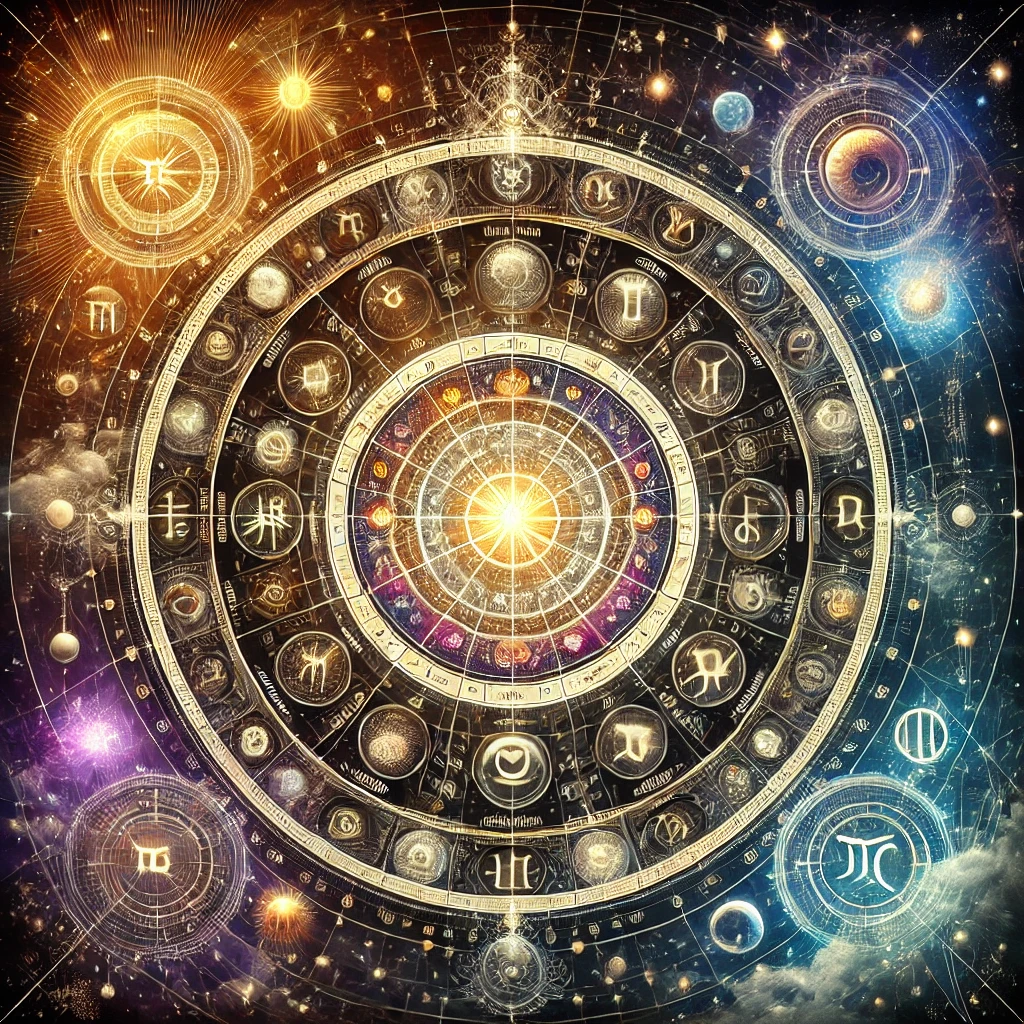Vedic astrology, also known as Jyotish or Jyotisha, is a traditional system of astrology that originated in ancient India. Rooted in the Vedas, the ancient sacred texts of Hinduism, Vedic astrology is based on the belief that the positions of celestial bodies influence human life and the course of events. Unlike Western astrology, which primarily uses the Tropical Zodiac, Vedic astrology uses the Sidereal Zodiac, which takes into account the actual positions of the stars. This system is deeply connected with spiritual teachings, offering insight into an individual’s life path, strengths, weaknesses, and karmic influences.
Core Concepts of Vedic Astrology
- The Twelve Zodiac Signs (Rashis)
Vedic astrology also uses twelve zodiac signs, similar to Western astrology. However, in Vedic astrology, the signs are based on the fixed stars (sidereal), meaning they are different from those used in Western (tropical) astrology. The twelve zodiac signs are:- Aries (Mesha)
- Taurus (Vrishabha)
- Gemini (Mithuna)
- Cancer (Karka)
- Leo (Simha)
- Virgo (Kanya)
- Libra (Tula)
- Scorpio (Vrischika)
- Sagittarius (Dhanu)
- Capricorn (Makara)
- Aquarius (Kumbha)
- Pisces (Meena)
- The Twelve Houses (Bhavas)
In Vedic astrology, the birth chart is divided into twelve houses, each representing different areas of life, such as personality, family, career, relationships, and health. Each house is associated with a specific sign, and the planets’ placement in these houses provides insights into various life events. - The Nine Planets (Navagraha)
Vedic astrology places a strong emphasis on the Navagraha or “nine planets,” which include:- Sun (Surya)
- Moon (Chandra)
- Mars (Mangala)
- Mercury (Budha)
- Jupiter (Guru)
- Venus (Shukra)
- Saturn (Shani)
- Rahu (North Node of the Moon)
- Ketu (South Node of the Moon)
- Nakshatras (Lunar Mansions)
Vedic astrology incorporates 27 Nakshatras or lunar mansions, which are divisions of the ecliptic, or path of the Moon. Each Nakshatra represents a specific energy or influence on an individual’s personality and life. The Moon’s position in one of the Nakshatras during birth is crucial in determining an individual’s characteristics and life path. - Dasha System (Planetary Periods)
The Dasha system is a unique feature of Vedic astrology, which divides an individual’s life into periods ruled by different planets. This system helps to predict the timing of events and experiences in a person’s life. The most commonly used Dasha system is the Vimshottari Dasha, which is based on the Moon’s position at the time of birth. - Karma and Reincarnation
Vedic astrology is deeply intertwined with the concept of karma and reincarnation. It is believed that the positions of the planets at birth are influenced by past-life actions and serve as a guide to understanding an individual’s soul’s journey. By studying the chart, astrologers can provide insights into a person’s karmic lessons and spiritual path.
The Birth Chart (Janma Kundali)
A person’s Janma Kundali or birth chart is a map of the positions of the planets at the time of their birth. In Vedic astrology, the chart is divided into twelve houses, and the planets are positioned in these houses based on the individual’s date, time, and place of birth. The birth chart provides a detailed blueprint of the person’s life, including strengths, weaknesses, challenges, and opportunities. Key aspects of the chart include:
- Ascendant (Lagna): The zodiac sign rising on the eastern horizon at the time of birth, which influences the individual’s outward behavior and appearance.
- Moon Sign: The position of the Moon at birth, which affects emotional responses, mind, and temperament.
- Sun Sign: The position of the Sun at birth, which represents the soul, ego, and vitality.
Vedic Astrology Techniques
- Transits (Gochar)
Transits in Vedic astrology are the movements of the planets through the signs and houses in relation to a person’s birth chart. These transits are analyzed to predict timing for events and major life shifts. - Ashtakavarga System
The Ashtakavarga system is used to calculate the strength of planets and their impact on various houses. It provides insights into how favorable or unfavorable specific periods may be in a person’s life. - Prashna (Horary Astrology)
Prashna or horary astrology is a method used to answer specific questions based on the moment the question is asked. The astrologer casts a chart for that moment and provides insights. - Muhurta (Auspicious Timing)
Muhurta is the practice of selecting the most auspicious time for important events such as weddings, business openings, and ceremonies. Vedic astrologers use the position of the planets to determine the most favorable time.
Applications of Vedic Astrology
- Personal Insights and Predictions
Vedic astrology provides detailed insights into a person’s character, life purpose, career, relationships, health, and spiritual journey. - Relationship Compatibility
By comparing the birth charts of two individuals, Vedic astrology can provide insights into relationship compatibility, highlighting areas of harmony and potential challenges. - Remedies and Gemstones
Vedic astrology often suggests remedies to counteract the negative influences of planets, such as chanting mantras, performing rituals, or wearing specific gemstones.
Cultural Significance
Vedic astrology plays an important role in the lives of many people in India and other parts of South Asia. It is used in personal decision-making, including choosing the right time for important life events, choosing life partners, and understanding spiritual growth. Vedic astrology is also integrated into Hinduism and many other spiritual practices, serving as a guide to living in alignment with cosmic energies.
Further Exploration
- The Role of Dasha Periods in Predicting Life Events
- The Influence of Nakshatras on Personality and Behavior
- How Vedic Astrology Intersects with Spiritual Growth and Karma
Vedic astrology offers a comprehensive and spiritual approach to understanding an individual’s life and purpose. By combining cosmic principles, spiritual insights, and practical techniques, Vedic astrology provides valuable guidance for navigating life’s challenges and opportunities.

